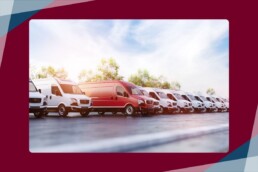Do I Need Insurance for My Commercial Fleet?
Logistics are essential for any company to operate well.
From the logistics used by our suppliers to provide us with vital goods and services, to the ability to transport our people or move equipment, logistics, and the vehicles that comprise said logistics, are crucial for growth.
What Is Commercial Fleet Insurance?
However you define your usage, if you own and operate three or more vehicles as part of your output, you will need to cover and protect those movements with commercial fleet insurance.
Commercial fleet insurance offers combined commercial auto policies with the intent of covering many vehicles in one go. This can provide a worthwhile means of securing a long-term, protected, fully insured backing to managing your fleet.
Commercial fleet insurance can be used by a wide array of companies, and is considered an essential insurance utility, much like worker’s compensation.
Rental companies, delivery services, taxi agencies, even governmental bodies all require the use of fleet insurance to protect their vehicles with the right financial and legal coverage.
Why Is It Beneficial For Business Owners & Their Employees/Drivers?
The main protections offered by fleet insurance includes blanketed coverage options of vehicles and the employee it will take to drive them. When an employee is behind the wheel of an insured vehicle as part of your fleet, they will be covered by this insurance.
As you can likely tell already, this is fundamental for companies that hire many drivers for many different vehicles, such as those managing long supply chain networks. It’s also beneficial for companies that have vehicles out on the road consistently.
As accidents or difficulties on the road are statistically much likelier than workplace injuries or liability issues, commercial fleet insurance could be considered one of the most valuable forms of insurance – and one of the most necessary.
What Does Commercial Fleet Insurance Cover?
Commercial fleet insurance provides auto liability insurance for all of your company’s vehicles, in one easy policy.
It will take into account your type of business, how often you have vehicles on the road, how they are stored, what condition they are in, their value, and the past difficulties you may have encountered.
This is all tallied to provide custom-fit fleet insurance coverage for your business. As it covers all of your vehicles and can be amended as you grow, it is a deeply convenient insurance option.
At the very least, fleet insurance cover provides you with the means to protect against liability issues as in line with New Jersey requirements.
This can then be further customized with options necessary for your daily requirements. For instance, increased liability limits could be important for certain businesses.
Roadside assistance could also be essential if you need immediate care for your vehicles should they require towing. Uninsured motorist coverage will protect your fleet against those unfortunate road users who feel themselves to be above the law.
Comprehensive coverage, also known as ‘other than collision’ in some areas, is there to help you protect against vandalism, theft and other risks associated with simply owning a vehicle.
A combination of these insurances, or going for them all with all the extras, can prove to be a worthy investment.
For many businesses, even having one element of their fleet out of operation can cause logistical issues. Having immediate financial recompense necessary to resolve these issues can be important.
What Policies Can You Add?
We have already discussed a few policies you can add to provide your custom-fit insurance solution. However, there are many more options available to you depending on your needs. They include:
- Replacement vehicles – this can be essential should you need to get back on the road and operational in a short space of time. Insurance claims can take some time to process, and so having this backup option can be a real lifesaver.
- Abroad use – It’s also important to consider how likely it is for your vehicles to move outside of the US.
- Public liability – this is known as the golden protective resource used should your fleet be responsible for the injury to a third party or damage to their property. It helps immediately cover those costs and protects against lawsuits.
- Trailers – and necessary storage attachments.
- Windscreen coverage – Debris on the roads and harmful driving conditions can sometimes cause damage to the vehicle, and the windscreen is likely to be affected in the same token. This means that covering for repair or replacement is essential.
What Types Of Vehicles Can Be Covered?
It’s important to know what types of vehicles can be covered, so you know where the limits lie. Thankfully, commercial fleet insurance is wide-spanning and is suitable for a wide array of vehicles, geared for a wide array of uses.
This includes:
- Taxies
- Company-issued cars
- HGV’s (heavy goods vehicles)
- Trucks
- Vans and service vans
- Motorcycles
- Minibusses
How Can You Save On Your Insurance?
It’s important to contact a qualified insurance provider or broker. They will be well-geared to help you with your particular needs.
The Soden Agency is there to help you with any particular questions you have, ensuring you get the best deal possible without skimping on adequate coverage.
There are some tips you can use to help get the best possible savings.
- Spend time improving your credit score from year to year. This will help you favorably when it comes time to renew.
- Increase your deductible payments. This one-time fee can help you ensure a cheaper package.
- Ensure you establish important policies that increase accountability and protect your drivers. For instance, ensuring they are fit to drive each day through verification, with a one-strike-you’re-out policy, can help prevent road accidents.
- Apply whatever discounts that may be offered.
- Consider GPS tracking. Some insurance providers are happier reviewing your claim if you can prove your regular logistical patterns.
With this advice, we hope you can more easily understand what kind of commercial fleet insurances you need for your logistical framework. From here, you can find the best coverage possible.
Related Articles
How to Navigate through Business Insurance Policies
Purchasing and managing business insurance in NJ is a big job. As a business owner, you’re responsible for understanding your risk and the coverages you need.…
Adding A Teenager To Your Auto Insurance Policy in NJ
Are you adding a teenager to your New Jersey auto insurance policy? This is probably an exciting time for your child, but it might be confusing for you. When…


